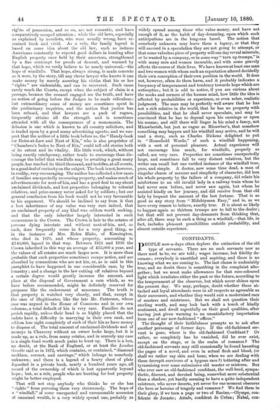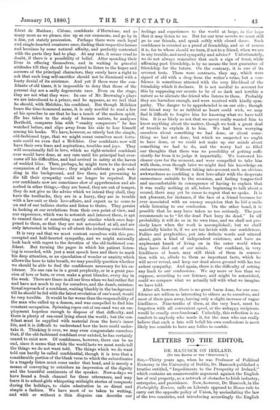CONFIDANTS.
PEOPLE now-a-days often deplore the extinction of the old type of servants. There are no such servants now as there used to be, we are told ; wages increase, but fidelity de- creases ; everybody is unsettled and aspiring, and there is no knowing what we are coming to. The last clause is undeniably true, and no doubt there is something in the complaint alto- gether; but we must make allowances for that rose-coloured light which irradiates either the past or the future, according to the temperament of the observer, but which never shines upon the present day. We may, perhaps, doubt whether these at- tached and loyal attendants were in all respects as agreeable as their successors, and whether they would suit a modernised race of masters and mistresses. But we shall not question their sterling worth, and may look back with a touch of kindly sentiment, and dwell regretfully on their good qualities, after having just given warning to an unsatisfactory importation from one of our new-fashioned "offices."
The thought of their faithfulness prompts us to ask after anothe personage of former days. If the old-fashioned ser- vant is gone, where is the old-fashioned Confidant ? Or rather, so completely has he vanished, did he ever exist, except on the stage, or in the realm of romance? The old-fashioned servants may still occasionally be found haunting the pages of a novel, and even in actual flesh and blood, (or shall we rather say skin and bone, when we are dealing with these decrepit survivors of a bygone race ?) tottering after and tyrannising over some submissive old master or mistress. But who ever saw an old-fashioned confidant, the well-bred, sympa- thetic, discreet, and devoted being, somewhat more substantial than a shadow, yet hardly seeming to have a quite independent existence, who never deserts, yet never for one moment obscures the hero or heroine of tragedy and romance ? We find them in their glory, if we turn a page or two of Racine,—Olympe, con- fidente de Jocaste; Attale, confident de Gaon; Nabal, con-
fident de Mathan ; Cleone, confidente d'Hermione, and, as many more as we please, rise up at our summons, and go by in a dim, yet stately procession. Perhaps there were such loyal and single-hearted creatures once, finding their respective heroes and heroines by some natural affinity, and perfectly contented with the parts they had to play. At any rate, it seems cruel to doubt, if there is a possibility of belief. After spending their ilives in effacing themselves, and in waiting in graceful attitudes till they should be required to listen to the hopes and sorrows of the principal characters, they surely have a right to ask that such long sell-sacrifice should not be dismissed with a hasty denial of its existence. And yet if these were the con- fidants of old times, it is impossible to deny that those of the present day are a sadly degenerate race. Even on the stage, they are not what they were. In one of Mr. Browning's plays 'we are introduced to a prince, and he appears, as we feel that he should, with Melchior, his confidant. But though Melchior -hears the time-honoured name, it is only needful to read a few of his speeches to see that he has a touch of the modern spirit. ile has taken to the study of human nature, he analyses Berthold, compares him with "sundry conquerors" he has -watched before, and slips away from his side to lose himself among his books. We have, however, so utterly lost the simple, -old-fashioned type, that we might count ourselves most fortu- nate could we even find a Melchior. Our confidants now will have their own fears and aspirations, troubles and joys. They will occasionally fall in love, which no right-minded confidant .ever would have done, at any rate until his principal had over- come all his difficulties, and had arrived in safety at the haven -of wedded bliss. Then, perhaps, he might turn to the devoted companion of the heroine ; they might celebrate a pale wed- -ding in the background, and live there, not presuming to die till their sympathy could no longer be required. But our confidants now are sometimes slow of apprehension and ab- sorbed in other things,—they are bored, they are out of temper, they do not give us the advice which we intend they shall, they have the toothache, they are in a hurry, they are in trouble with a law-suit or their love-affairs, and expect us to come to -an end of our tedious stories and listen to theirs. They persist in looking at our revelations from their own point of view, and our experience, which was to astonish and interest them, is apt to remind them of something exactly similar which once hap- pened to them, so that they are not astonished at all, and are only interested in telling us all about the irritating coincidence.
It is very sad that we must content ourselves with this pre- -occupied and half-hearted sympathy, and we might naturally 'look back with regret to the devotion of the old-fashioned con- fidant. But turning the pages in which his patient listen- ing is recorded, with just a neat speech here and there to mark 'his deep attention, or an ejaculation of wonder or anxiety which allows the hero to take breath, we may possibly question whether 'we should be able to find the confidences necessary for his ex- istence. No one can be in a great perplexity, or in a great pas- -sion of love or hate, or even make a great blunder, every day in the week. There are times in all our lives when we feel rather flat and have not much to say for ourselves, and the dumb, uninten- tional reproach of a confidant, waiting blankly in the background till he should be fed with the latest revelation of one's soul, would be very terrible. It would be far worse than the responsibility of the man who called up a demon, and was compelled to find him 'constant occupation. Spinning ropes out of sea-sand VMS an em- ployment hopeless enough to dispose of that difficulty, and -there is plenty of sea-sand lying about the world; but the con- fidant must be supplied with material from the hero's inner life, and it is difficult to understand how the hero could under- take it. Thinking it over, we may even congratulate ourselves that if the old-fashioned confidant ever existed, he has certainly -ceased to exist now. Of confidences, however, there can be no -end, since it seems that while the world lasts we must needs tell the things we do not want told. The things which we do want told can hardly be called confidential, though it is true that a considerable portion of the blank verse to which the subordinates in a tragedy listen must come under that head, and is merely a means of conveying to outsiders an impression of the dignity and the beautiful sentiments of the speaker. Now-a-days we have found a fresh channel for these utterances, and may leave it to school-girls whispering midnight stories of conquests 'during the holidays, to claim admiration in so direct and simple a fashion. We have most of us taken to writing, and with or without a thin disguise can describe our
feelings and experiences to the world at large, in the hope that it may listen to us. But for our true secrets we must still go to our friends, and speak softly with closed doors. Such confidence is counted as a proof of friendship, and so of course it is, for to whom should we turn, if not to a friend, when we are in any trouble, and need sympathy and advice? Unfortunately, we do not always remember that such a sign of trust, while affirming past friendship, is by no means the best guarantee of friendship for the future. On the contrary, it is one of its severest tests. There were contracts, they say, which were signed of old with a drop from the writer's veins, but a con- fidence is sometimes attested with the very life-blood of the friendship which it declares. It is not needful to account for this by supposing our secrets to be of so dark and terrible a nature as to alienate the friend who listens to them. Probably they are harmless enough, and were received with kindly sym- pathy. The danger to be apprehended is on our side ; though our friend may be as faithful as heart could wish, we may find it difficult to forgive him for knowing what we have told him. It is as likely as not that we never really wanted him to know anything about the matter, though we took a great deal of trouble to explain it to him. We had been worrying ourselves about something we had done, or about some- thing we had not done, but which we suspected we ought to have done, or we could not make up our minds about something we had to do, and the worry had so tilled our thoughts that there was no possibility of getting suffi- ciently far from it to judge it impartially. We borrowed his clearer eyes for the moment, and were compelled to take him with them, even though later we might find his knowledge an embarrassment. Without taking into account such an obvious awkwardness as confiding a first love-affair with the desperate earnestness suitable to the occasion, and feeling tongue-tied and uncomfortable in consequence of having to explain that it was really nothing at all, before beginning to talk about a second, there may yet be cause to regret that we spoke. It is not pleasant, for instance, if the face of a friend becomes for ever associated with an uneasy suspicion that he bid a smile while listening to our confession. On the other hand, it is possible that he may have taken us too seriously. The poet recommends us to "let the dead Past bury its dead." In all probability it will do so in its own time, and we shall not pre- cisely know when the work is accomplished; but we shall materially hinder it, if we are too lavish with our confidences. Follies and perplexities, put into definite words and uttered aloud, gain a kind of independent existence, and have an unpleasant knack of living on in the outer world when they have died out of our minds. Our confidant, in very kindliness of heart, may still think of them in connec- tion with us, allude to them as important facts, which he will never reveal, and keep our dead above ground with his too ardent sympathy. And again, there is the difficulty of setting any limit to our confessions. We say more or less than we suppose, according to our listener, and might be astonished, could we compare what we actually tell with what we imagine we have told.
After all, however, there is no great harm done, for our con- fidences are seldom as interesting to others as to ourselves, and most of them pass away, leaving only a slight increase of vague kindliness. Nine-tenths of them, at the very least, must be forgotten with all convenient speed, or the unhappy recipients would be cruelly over-burdened. Unluckily, this reflection is no comfort to anybody who needs it, for the man who can really believe that such a fate will befall his own confessions is most likely too sensible to have any follies to confide.



































 Previous page
Previous page